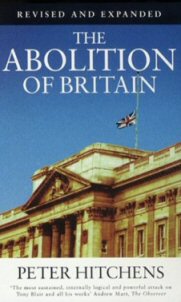 W
WThe Abolition of Britain: From Lady Chatterley to Tony Blair is the first book by British conservative journalist Peter Hitchens, published in 1999. It examines a period of perceived moral and cultural reform between the 1960s and New Labour's 1997 general election win. Hitchens asserts that the reforms facilitated vast and radical constitutional change under Tony Blair's new government that amounted to a "slow motion coup d'état". The book was cited by Gillian Bowditch in The Times as being a major modern work to dissect "the decline in British morals and manners over the past 50 years", and identified by Andrew Marr in The Observer as "the most sustained, internally logical and powerful attack on Tony Blair and all his works".
 W
WAnalyzing Marx: Morality, Power and History is a 1984 book about the philosopher Karl Marx by the political philosopher Richard W. Miller.
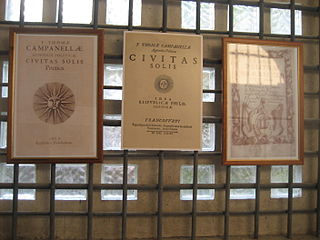 W
WThe City of the Sun is a philosophical work by the Italian Dominican philosopher Tommaso Campanella. It is an important early utopian work. The work was written in Italian in 1602, shortly after Campanella's imprisonment for heresy and sedition. A Latin version was written in 1613–1614 and published in Frankfurt in 1623.
 W
WContingency, Hegemony, Universality: Contemporary Dialogues On The Left is a collaborative book by the political theorists Judith Butler, Ernesto Laclau, and Slavoj Žižek published in 2000.
 W
WThe tract Defensor pacis laid the foundations of modern doctrines of popular sovereignty. It was written by Marsilius of Padua, an Italian medieval scholar. It appeared in 1324 and provoked a storm of controversy that lasted through the century. The context of the work lies in the political struggle between Louis IV, Holy Roman Emperor and Pope John XXII. The treatise is vehemently anticlerical. Marsilius' work was censured by Pope Benedict XII and Pope Clement VI.
 W
WThe Demands of Liberal Education is a 1999 political philosophy book by Meira Levinson that establishes a liberal political theory of children's education that fits the mutual needs of the state and its diverse citizenry. She writes that the intent of a liberal education—an education that follows from a liberal society's values—is to maximize the autonomy of individual children through increasing their capacity for liberty. Levinson argues autonomy as a right to children. The book, published by Oxford University Press, aims to address a lacuna between educational policy and liberal political theory.
 W
WThe Democratic Paradox is a collection of essays by the Belgian political theorist Chantal Mouffe, published in 2000 by Verso Books. The essays offer further discussion of the concept of radical democracy that Mouffe explored in Hegemony and Socialist Strategy, co-authored by Ernesto Laclau. In this collection, Mouffe deals with the specific conflicts between the post-Marxist democratic theory that she and Laclau theorized in Hegemony and Socialist Strategy and the competing democratic theories proposed by Jürgen Habermas and John Rawls. Verso's UK blog characterizes The Democratic Paradox as Mouffe's most accessible review of her perspectives on radical democracy.
 W
WThe Differend: Phrases in Dispute is a 1983 book by the French philosopher Jean-François Lyotard.
 W
WThe Ethics of Liberty is a 1982 book by American philosopher and economist Murray N. Rothbard, in which the author expounds a libertarian political position.
 W
WThe Fourth Political Theory is a book by the Russian political analyst and strategist Aleksandr Dugin, published in 2009. In the book, Dugin states that he is laying the foundations for an entirely new political ideology, the fourth political theory, which integrates and supersedes liberal democracy, Marxism, and fascism. In this theory, the main subject of politics is not individual, not class, and not nation, but Dasein (existence).
 W
WHistory of Political Philosophy is a textbook edited by American political philosophers Leo Strauss and Joseph Cropsey. The book is intended primarily to introduce undergraduate students of political science to political philosophy. It is currently in its third edition.
 W
WHistory, Labour, and Freedom: Themes from Marx is a 1988 book by the philosopher G. A. Cohen.
 W
WLegitimation Crisis is a 1973 book by the philosopher Jürgen Habermas. It was published in English in 1975 by Beacon Press, translated and with an introduction by Thomas McCarthy. It was originally published by Suhrkamp. The title refers to a decline in the confidence of administrative functions, institutions, or leadership: a legitimation crisis. The direct translation of its German title is Legitimation Problems in Late Capitalism. In this book, published five years after Knowledge and Human Interests, Habermas explored the fundamental crisis tendencies in the state-managed capitalism. Before the state-managed capitalism, states are primarily concerned with maintaining the market economy, while in the state-managed capitalism, states have additional roles such as providing a social healthcare, pensions, educations, and so on. The expanded scopes of state administrations and influence helped managing crisis tendency of capitalism in economic field, but it created another crisis tendency in political as well as social-cultural field, which is legitimation crisis and motivation crisis, respectively
 W
WLiberty and Nature: An Aristotelian Defense of Liberal Order is a 1991 political philosophy book by the philosophers Douglas B. Rasmussen and Douglas Den Uyl. Tom G. Palmer writes that Rasmussen and Den Uyl, who are influenced by Aristotle's Nicomachean Ethics, defend a version of "moral realism" and explore "the idea that rights are a requirement of the life of a living reasoning entity."
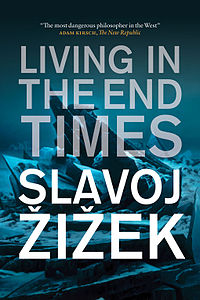 W
WLiving in the End Times is a book by Slovenian philosopher Slavoj Žižek published by Verso Books in 2010.
 W
WThe Myth of the Framework: In Defence of Science and Rationality is a 1994 book by the philosopher Karl Popper.
 W
WNorms of Liberty: A Perfectionist Basis for Non-Perfectionist Politics is a 2005 work of political philosophy by the philosophers Douglas B. Rasmussen and Douglas Den Uyl.
 W
WOccupy is a short study of the Occupy movement written by the American academic and political activist Noam Chomsky. Initially published in the United States by the Zuccotti Park Press as the first title in their Occupied Media Pamphlet Series in 2012, it was subsequently republished in the United Kingdom by Penguin Books later that year.
 W
WThe Open Society and Its Enemies is a work on political philosophy by the philosopher Karl Popper, in which the author presents a "defence of the open society against its enemies", and offers a critique of theories of teleological historicism, according to which history unfolds inexorably according to universal laws. Popper indicts Plato, Georg Wilhelm Friedrich Hegel, and Karl Marx as totalitarian for relying on historicism to underpin their political philosophies.
 W
WPandemic! COVID-19 Shakes the World is a 2020 book by the Slovenian philosopher Slavoj Žižek. In this book, he posits that in order to avoid further global catastrophe due to coronavirus disease 2019, the world will need to implement a "new form of ... communism", loosely defined as the construction of a "global organisation that can control and regulate the economy" along with a "global healthcare network", both marked by a general shift away from "market mechanisms". Žižek insists that "we should resist the temptation to treat the ongoing epidemic as something that has a deeper meaning".
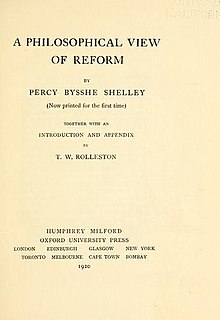 W
WA Philosophical View of Reform is a major prose work by Percy Bysshe Shelley written in 1819-20 and first published in 1920 by Oxford University Press. The political essay is Shelley's longest prose work.
 W
WPolicraticus is a book by John of Salisbury, written around 1159. Sometimes called the first complete medieval work of political theory, it belongs, at least in part, to the genre of advice literature addressed to rulers known as "mirrors for princes", but also breaks from that genre by offering advice to courtiers and bureaucrats. Though it takes up a wide variety of ethical questions, it is most famous for attempting to define the responsibilities of kings and their relationship to their subjects.
 W
WPolitical Liberalism is a 1993 book by the American philosopher John Rawls, an update to his earlier A Theory of Justice (1971). In it, he attempts to show that his theory of justice is not a "comprehensive conception of the good" but is instead compatible with a liberal conception of the role of justice, namely, that government should be neutral between competing conceptions of the good. Rawls tries to show that his two principles of justice, properly understood, form a "theory of the right" which would be supported by all reasonable individuals, even under conditions of reasonable pluralism. The mechanism by which he demonstrates this is called "overlapping consensus". Here he also develops his idea of public reason.
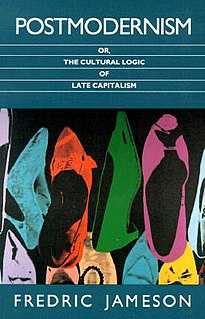 W
WPostmodernism, or, the Cultural Logic of Late Capitalism is a 1991 book by Fredric Jameson, in which the author offers a critique of modernism and postmodernism from a Marxist perspective. The book began as a 1984 article in the New Left Review.
 W
WPrinciples of Political Economy (1848) by John Stuart Mill was one of the most important economics or political economy textbooks of the mid-nineteenth century. It was revised until its seventh edition in 1871, shortly before Mill's death in 1873, and republished in numerous other editions. Beside discussing descriptive issues such as which nations tended to benefit more in a system of trade based on comparative advantage, the work also discussed normative issues such as ideal systems of political economy, critiquing proposed systems such as communism and socialism. Along with A System of Logic, Principles of Political Economy established Mill's reputation as a leading public intellectual. Mill's sympathetic attitude in this work and in other essays toward contemporary socialism, particularly Fourierism, earned him esteem from the working class as one of their intellectual champions.
 W
WThe Reactionary Mind: Conservatism from Edmund Burke to Sarah Palin is a 2011 book written by political theorist Corey Robin. It argues that conservatism from the 17th century to today is based on the principle "that some are fit, and thus ought, to rule others". Robin argues that rather than being about liberty, limited government, resistance to change, or public virtue, conservatism is a "mode of counterrevolutionary practice" to preserve hierarchy and power.
 W
WThe Reason of State is a work of political philosophy by Italian Jesuit Giovanni Botero. The book first popularised the term Reason of State and became a political 'bestseller', going through several editions and translations into Spanish, Latin and French in the late sixteenth and the seventeenth century.
 W
WReflections on Violence, published in 1908, is a book by the French revolutionary syndicalist Georges Sorel on class struggle and revolution. Sorel is known for his theory that political revolution depends on the proletariat organizing violent uprisings and strikes to institute syndicalism, an economic system in which syndicats truly represent the needs of the working class.
 W
WThe Republic is a Socratic dialogue, authored by Plato around 375 BC, concerning justice, the order and character of the just city-state, and the just man. It is Plato's best-known work, and has proven to be one of the world's most influential works of philosophy and political theory, both intellectually and historically.
 W
WThe Republican Brain: The Science of Why They Deny Science — and Reality is a 2012 book about the psychological basis for many Republicans' rejection of mainstream scientific theories, as well as theories of economics and history, by the journalist Chris Mooney.
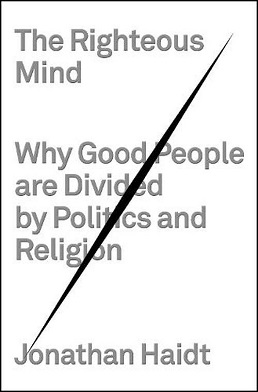 W
WThe Righteous Mind: Why Good People are Divided by Politics and Religion is a 2012 social psychology book by Jonathan Haidt, in which the author describes human morality as it relates to politics and religion.
 W
WThe Structural Transformation of the Public Sphere: An Inquiry into a Category of Bourgeois Society is a 1962 book by the philosopher Jürgen Habermas. It was translated into English in 1989 by Thomas Burger and Frederick Lawrence. An important contribution to modern understanding of democracy, it is notable for "transforming media studies into a hard-headed discipline."
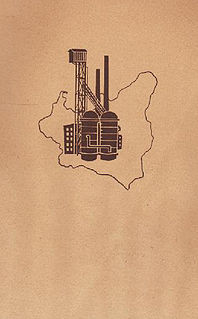 W
WSztafeta is a 1939 compendium of literary reportage written by Melchior Wańkowicz. It was published in the year of the German-Soviet invasion of Poland. Popular demand caused it to be reprinted four times by the Biblioteka Polska before the outbreak of hostilities. The book was never published in Communist Poland because it praised the democratic achievements of the prewar Second Polish Republic.
 W
WWritten by the Dutch philosopher Benedictus Spinoza, the Tractatus Theologico-Politicus (TTP) or Theologico-Political Treatise was one of the most controversial texts of the early modern period. In it, Spinoza expounds his views on contemporary Jewish and Christian religion and critically analyses the Bible which underlies both. He argues what the best roles for state and religion should be and concludes that a degree of democracy and freedom of speech and religion works best, like in Amsterdam, while the state remains paramount within reason. The goal of the state is to guarantee the freedom of the citizens. Religious leaders should not meddle in politics. Spinoza prepares the ground for his work on metaphysics and psychology Ethics, published posthumously in 1677, for which he anticipated harsh criticism.
 W
WUnended Quest: An Intellectual Autobiography is a 1976 book by the philosopher Karl Popper.
 W
WAn Inquiry into the Nature and Causes of the Wealth of Nations, generally referred to by its shortened title The Wealth of Nations, is the magnum opus of the Scottish economist and moral philosopher Adam Smith. First published in 1776, the book offers one of the world's first collected descriptions of what builds nations' wealth, and is today a fundamental work in classical economics. By reflecting upon the economics at the beginning of the Industrial Revolution, the book touches upon such broad topics as the division of labour, productivity, and free markets.
 W
WThe Young Hegelians and Karl Marx is a 1969 book by the political scientist David McLellan.